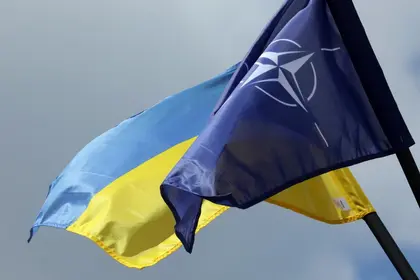In late October 2023, US President Joe Biden delivered a historic speech that outlined the vision for the future global order and international security system.
He equated Vladimir Putin’s “Russian Empire” and terrorists from Hamas as global challenges to the survival of civilization. Effectively, this marks a new “Sinews of Peace,” reminiscent of Winston Churchill’s 1946 address that marked the beginning of the Cold War, leading to the formation of the NATO bloc to counter Soviet aggression and its satellites. Biden’s speech, in turn, serves as the final point for the security system established after World War II. It is now time to create a new one.
JOIN US ON TELEGRAM
Follow our coverage of the war on the @Kyivpost_official.
During the creation of the North Atlantic Treaty Organization (NATO), the world was bipolar, with the main confrontation between the capitalist and “socialist” worlds. Against this backdrop, all other conflicts between countries within NATO or the Warsaw Pact took a back seat. Accordingly, in the Western bloc, Greece and Turkey could coexist peacefully, united by the common goal of containing the “red menace,” despite their smoldering conflicts.
After the collapse of the USSR and the Warsaw Pact, the understandable enemy ceased to exist. More precisely, the West stopped feeling threatened by Russia and its proxies. Capitalism “won” and countries from the losing bloc began to rapidly move from enemies to allies. And let’s be frank – very expensive allies. NATO was doing anything but curbing the Kremlin’s growing imperial ambitions. Reality has shown that the Alliance’s generals have been wearing rose-colored glasses for too long and have been reclassified from military officers to bureaucrats.
In the time since the collapse of the USSR, new threats emerged that NATO and the West slept through while enjoying the fruits of peaceful life. The imperial syndromes of Russia, China, and even Hungary and Turkey resurfaced. The world faced a new phase of confrontation between the Christian and Muslim worlds, and these fault lines are already evident within structures formed 70 years ago, including within NATO. The Alliance, of course, is currently more effective than the UN, which demonstrated complete helplessness in the face of new threats but is also living out its final days.
We stand on the threshold of reforming the familiar global order, where other organizations will play a key role, adequately responding to new threats to civilization. They will likely be fewer but more mobile in decision-making, with a more equitable distribution of functionality and expenses. Currently, NATO relies mainly on the United States and the United Kingdom. In mini-alliances, the burden will be shared equally. This began in 2021 when the US, UK, and Australia (with silent support from New Zealand) established the AUKUS military bloc to deter potential Chinese aggression in the Pacific region.
When similar alliances begin to form within the EU by countries with a shared vision of their collective security and existing threats, it is only a matter of time. In the near future, we are likely to witness the creation of the Eastern European “Bloc of New Europe,” with the participation of the United Kingdom and possibly the United States. Similar coalitions will emerge in Asia, Africa, and South America. The only commonality among these blocs will be the involvement of global players such as the UK, US, or China.
A multipolar world awaits us. In this scenario, NATO has the potential to become a superstructure over this diversity of military alliances, effectively taking on the responsibilities of the UN. Moreover, the Alliance has long outgrown the epithet “North Atlantic.” Japan has expressed its desire to join NATO, and similar applications from Korea, Australia, and several other states are on the horizon. As part of this reform, issues of maintaining peace will no longer be decided by the victorious countries of World War II but by a security council consisting of representatives from defense blocs worldwide.
In this context, an interesting perspective unfolds before Kyiv. Not just after victory over the “Russian Empire,” but even now, Ukraine has something to offer to its Western partners. For example, military assistance in combating Russian private armies in Asia and Africa. As demonstrated by the experience of the Ukrainian special forces in Sudan against the Wagner Group, Ukrainians are more effective in countering Russian non-state mercenaries than similar units from France, which lost the Sahel region.
Deploying a limited military contingent of no more than 20,000 personnel will not be critical for our front against Russia. However, the political impact of deepening cooperation with global players, the sense of being an active participant, will be immense. Its value can be measured in hundreds of units of military equipment and millions of projectiles, essential for reclaiming territories occupied by Russians.
After defeating the “second-strongest army of the world,” Ukraine will be a highly promising and significant player in these new security structures. All defense blocs, especially those in Eastern Europe, will seek Ukraine’s participation. Ukrainians may even find that joining NATO (currently a goal) is no longer obligatory.
Instead, Kyiv will have to establish its regional defense alliance with the involvement of the US, the UK, Poland, or the Baltic states, playing a key role not only in the Baltic-Black Sea region but globally. Ukraine will have numerous reasons to be a weighty player – the most experienced army on the continent (if not in the world), economic potential for recovery, and our victory over the “Russian Empire” with its de facto dismantling.
The advantages Ukraine can provide the West will position it to claim a key role in the security of not only Europe but the entire world. A new world that will rise from the ruins of alliances and institutions existing before Feb. 24, 2022.
The views expressed in this opinion article are the author’s and not necessarily those of Kyiv Post.
You can also highlight the text and press Ctrl + Enter



